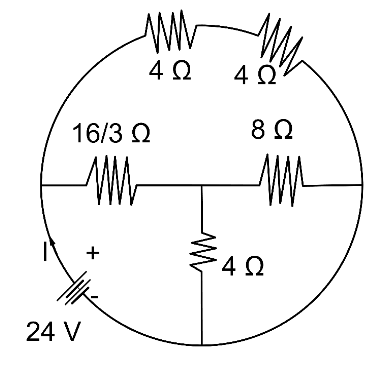Question
Question: What is the total current supplied by the battery to the circuit shown in the following figure? 
A. 2 A
B. 4 A
C. 6 A
D. 9 A
Solution
We will first evaluate the equivalent resistance of the circuit. Then we will use the formula of ohm’s law to evaluate the current through the circuit with the help of basic formulae..
Formulae Used:
RSeries = R1 + R2 + .... + Rn
⇒RParallel1 = R11 + R21 + .... + Rn1
⇒I = RV
Complete step by step answer:
We will discuss the ohm’s law a bit in detail. An experiment was performed to evaluate a relation between current and potential differences. It was observed that
V ∝ I
A proportionality constant R was introduced. Thus, the equation evaluated was
V = RI
R is known as the resistance of the circuit which is simply defined as the opposition offered by any conductor to flowing charges in it. Now, the ohm’s law was defined as the potential difference across a circuit that is directly proportional to the current flowing through the circuit at constant temperature.
Let, R1 = 4 Ω
⇒R2 = 4 Ω
⇒R3 = 316 Ω
⇒R4 = 4 Ω
⇒R5 = 8 Ω
Now,
R1 and R2 are in series
Thus,
RUp = R1 + R2
Substituting the values, we get
RUp = 4 + 4 = 8 Ω
Now,
R4 and R5 are in parallel
Thus,
RMid1 = R41 + R51
Substituting the values, we get
RMid1 = 41 + 81 = 83
Further, we get
RMid = 38 Ω
Now,
RMid and R3 are in series
Thus,
Rcentral = RMid + R3
Substituting the values, we get
Rcentral = 38 + 316 ⇒Rcentral = 324 ⇒Rcentral = 8 Ω
Now, Rcentral and RUp are in parallel
Thus,
Req1 = Rcentral1 + RUp1
Substituting the values, we get
Req1 = 81 + 81 ⇒Req1 = 41
Thus, we get
Req = 4 Ω
Now,
According to ohm’s law, we know
I = ReqV
Putting in the values, we get
I = 424
Further, we get
∴I = 6 A
Hence, the correct answer is C.
Note: Students should be very cautious while judging the type of combination of resistors. Students often make mistakes while putting in the final resistance calculated of a parallel combination as the formula is of a reciprocated type. Thus, they should be very cautious while doing the same.
